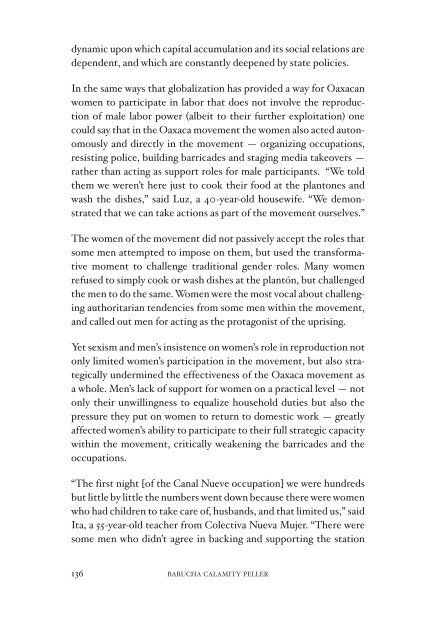Lies: A Journal of Materialist Feminism - Libcom
Lies: A Journal of Materialist Feminism - Libcom
Lies: A Journal of Materialist Feminism - Libcom
You also want an ePaper? Increase the reach of your titles
YUMPU automatically turns print PDFs into web optimized ePapers that Google loves.
dynamic upon which capital accumulation and its social relations are<br />
dependent, and which are constantly deepened by state policies.<br />
In the same ways that globalization has provided a way for Oaxacan<br />
women to participate in labor that does not involve the reproduction<br />
<strong>of</strong> male labor power (albeit to their further exploitation) one<br />
could say that in the Oaxaca movement the women also acted autonomously<br />
and directly in the movement — organizing occupations,<br />
resisting police, building barricades and staging media takeovers —<br />
rather than acting as support roles for male participants. “We told<br />
them we weren’t here just to cook their food at the plantones and<br />
wash the dishes,” said Luz, a 40-year-old housewife. “We demonstrated<br />
that we can take actions as part <strong>of</strong> the movement ourselves.”<br />
The women <strong>of</strong> the movement did not passively accept the roles that<br />
some men attempted to impose on them, but used the transformative<br />
moment to challenge traditional gender roles. Many women<br />
refused to simply cook or wash dishes at the plantón, but challenged<br />
the men to do the same. Women were the most vocal about challenging<br />
authoritarian tendencies from some men within the movement,<br />
and called out men for acting as the protagonist <strong>of</strong> the uprising.<br />
Yet sexism and men’s insistence on women’s role in reproduction not<br />
only limited women’s participation in the movement, but also strategically<br />
undermined the effectiveness <strong>of</strong> the Oaxaca movement as<br />
a whole. Men’s lack <strong>of</strong> support for women on a practical level — not<br />
only their unwillingness to equalize household duties but also the<br />
pressure they put on women to return to domestic work — greatly<br />
affected women’s ability to participate to their full strategic capacity<br />
within the movement, critically weakening the barricades and the<br />
occupations.<br />
“The first night [<strong>of</strong> the Canal Nueve occupation] we were hundreds<br />
but little by little the numbers went down because there were women<br />
who had children to take care <strong>of</strong>, husbands, and that limited us,” said<br />
Ita, a 55-year-old teacher from Colectiva Nueva Mujer. “There were<br />
some men who didn’t agree in backing and supporting the station<br />
136<br />
BARUCHA CALAMITY PELLER

















